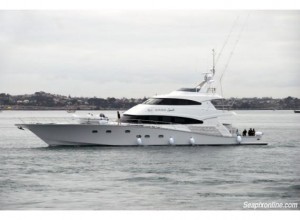The Amir of Qatar, a yacht built in New Zealand and sailed to Australia, and the Australian Federal Court

In Thor Shipping A/S v The Ship “Al Duhail” [2008] FCA 1842 (5 December 2008) the Australian Federal Court considered damages proceedings in its admiralty jurisdiction against the Ship Al Duhail. The proceedings were brought by the owner of a cargo vessel, Thor Shipping, which had been chartered to carry the Al Duhail from New Zealand, where it was constructed, to the Seychelles. In fact, in an alleged breach of the charterparty by the charterer, the Al Duhail was never loaded onto the cargo vessel, and was instead sailed from New Zealand to Australia, where it was arrested following the commencement of the proceedings. The writ alleged that the charterparty was entered into by agents of the Amir of Qatar, the Head of State of Qatar. The Amir applied for release of the ship on the bases that the Federal Court’s admiralty jurisdiction had not been engaged and that, in any event, he enjoyed head of state immunity.
As to the first point, pursuant to s 17 of the Admiralty Act 1988 (Cth), for the admiralty jurisdiction to be engaged, it was necessary that the Amir was the owner, or in possession or control, of the Al Duhail at the time the cause of action arose and also at the time of commencement of the proceedings. It was common ground that the latter requirement was made out. However, the Amir contended that at the time the cause of action arose, ie when the charterparty was breached, he was not the owner of the Al Duhail.
At the time of breach, the Al Duhail was under construction and the agreement with the construction company, governed by English law, provided that title did not pass to the Amir from the construction company until the Al Duhail had been accepted by the Amir and all payments had been made. That had not occurred. Thor Shipping asserted, among other things, that title had nevertheless passed to the Amir pursuant to the law of Qatar when the Al Duhail was registered in Qatar in the name of the Amir, which occurred before breach of the charterparty. There is Full Court authority for the view that in cases where a ship has been registered, the law of the place of registration governs questions of title, property and assignment of the ship as the lex situs: Tisand (Pty) Ltd v The Owners of the Ship MV “Cape Moreton” (ex “Freya”) (2005) 143 FCR 43; [2005] FCAFC 68. However, in this case, Dowsett J considered it uncertain, in circumstances where it was said that registration itself effected a transfer of title, whether the law governing ownership should be the law of the place of registration (Qatar) or the law of the place where the Al Duhail was at the time (New Zealand) or the law applicable to the construction contract (England).
Ultimately, Dowsett J did not have to reach a conclusion on this issue, because he considered that the Amir was entitled to head of state immunity pursuant to the Foreign States Immunities Act 1985 (Cth) and the Diplomatic Privileges and Immunities Act 1967 (Cth). It was common ground that any relevant immunity of the Amir was that applicable in his private capacity. Pursuant to s 36 of the Foreign States Immunities Act, as in the UK, the immunity was that extended by the Diplomatic Privileges and Immunities Act to the head of a diplomatic mission, with such modifications as are necessary. The latter act applies provisions of the Vienna Convention on Diplomatic Relationsas Australian law. In particular, it applies art 31, which provides for a general immunity from civil jurisdiction, subject to certain exceptions none of which were relevant in this case. Dowsett J rejected Thor Shipping’s contention that the effect of art 39 was to apply the immunity to the Amir in his private capacity only when in Australia. That article relevantly provides:
(1) Every person entitled to privileges and immunities shall enjoy them from the moment he enters the territory of the receiving State on proceeding to take up his post or, if already in its territory, from the moment when his appointment is notified to the Ministry for Foreign Affairs or such other ministry as may be agreed.
(2) When the functions of a person enjoying privileges and immunities have come to an end, such privileges and immunities shall normally cease at the moment when he leaves the country, or on expiry of a reasonable period in which to do so, but shall subsist until that time, even in case of armed conflict. However, with respect to acts performed by such a person in the exercise of his functions as a member of the mission, immunity shall continue to subsist.
Dowsett J concluded:
The error in the plaintiff’s submission is the characterization of article 39 as a geographical limitation upon diplomatic immunity. In fact, it is designed to give immunity whilst the relevant diplomatic agent is in post, whether or not he or she is in the receiving state. It commences upon arrival in that state for the purpose of taking up the post, and terminates upon completion of his or her functions and departure. The geographical references in [art] 39 reflect the nature of the diplomatic agent’s duties which generally require that he or she be in the relevant country in order to perform them. However he or she enjoys immunity whilst in post, regardless of location. It is that degree of immunity which must be extended to heads of state pursuant to s 36 of the [Foreign States Immunities Act].
This is consistent with the approach to art 39 adopted by Lord Browne Wilkinson and Lord Goff of Chieveley in the House of Lords in R v Bow Street Metropolitan Stipendiary Magistrate; Ex parte Pinochet Ugarte [No 3] [2000] 1 AC 147; [1999] UKHL 17.